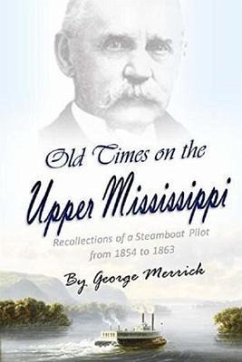"We know of no better account, from the inside, of steamboating." -American Historical Review, 1909
"It is impossible to read of such devil-may-care steamboating without a regret that there is none of it to be had these days."-New York Times Book Review, 1969
"A well proportioned well written and vivid account." -Athenium, 1909
George Merrick (1841-1931), in a variety of capacities, sailed up and down the Mississippi River from 1854 to 1863. As he notes in his 1909 book "Old Times on the Upper Mississippi," the life of those who manned the steamers of the once mighty fleet of the Upper Mississippi is legendary, almost mythical.
Prior to Merrick's publication, its story was unwritten. To the few participants who yet remained, it was but a memory. The boats themselves had disappeared, leaving no token. The masters and the mates, the pilots and the clerks, the engineers and the men of humbler station had likewise gone. Of the thousands who contributed to give life and direction to the vessels themselves, a meager score of short biographies was all that history vouchsafed.
Merrick's book chronicles the panorama of his steamboat experiences in the mid-1800s on the mighty Mississippi, where he started as a cabin boy and worked up to cub pilot. Originally published in 1909, these lively stories about gamblers, shipwrecks, and steamboat races feature rich descriptions of river life and steamboat operations.
The aim of Merrick's volume was to tell something of these men, and of the boats that they made sentient by their knowledge and power; to relate something of the incidents of river life as seen by a boy during eight years of residence by the riverside, or in active service on the river itself. Merrick states that although it may not literally be claimed, "All of which I saw," it was with satisfaction, not unmixed with pride, that the writer can truthfully assert, "A part of which I was."
"I have said that in addition to 'knowing the river', and knowing that he knows it, the young pilot must also be fortified with a large measure of self-reliance, or all else will go for nothing. The time of trial comes to every one, sooner or later, and the manner in which it is met usually determines the standing of the young novitiate in the estimation of river men. ... My own 'baptism'- not of 'fire', but of water and lightning- came on the very first trip I made alone on a steamboat...."
Merrick had a mind insatiable of detail and an almost singular appreciation of the dramatics of steamboating. He was not only a notable historian himself but the cause of much history writing by others and his is an interesting account of a long-past era in Mississippi River transportation.
"It is impossible to read of such devil-may-care steamboating without a regret that there is none of it to be had these days."-New York Times Book Review, 1969
"A well proportioned well written and vivid account." -Athenium, 1909
George Merrick (1841-1931), in a variety of capacities, sailed up and down the Mississippi River from 1854 to 1863. As he notes in his 1909 book "Old Times on the Upper Mississippi," the life of those who manned the steamers of the once mighty fleet of the Upper Mississippi is legendary, almost mythical.
Prior to Merrick's publication, its story was unwritten. To the few participants who yet remained, it was but a memory. The boats themselves had disappeared, leaving no token. The masters and the mates, the pilots and the clerks, the engineers and the men of humbler station had likewise gone. Of the thousands who contributed to give life and direction to the vessels themselves, a meager score of short biographies was all that history vouchsafed.
Merrick's book chronicles the panorama of his steamboat experiences in the mid-1800s on the mighty Mississippi, where he started as a cabin boy and worked up to cub pilot. Originally published in 1909, these lively stories about gamblers, shipwrecks, and steamboat races feature rich descriptions of river life and steamboat operations.
The aim of Merrick's volume was to tell something of these men, and of the boats that they made sentient by their knowledge and power; to relate something of the incidents of river life as seen by a boy during eight years of residence by the riverside, or in active service on the river itself. Merrick states that although it may not literally be claimed, "All of which I saw," it was with satisfaction, not unmixed with pride, that the writer can truthfully assert, "A part of which I was."
"I have said that in addition to 'knowing the river', and knowing that he knows it, the young pilot must also be fortified with a large measure of self-reliance, or all else will go for nothing. The time of trial comes to every one, sooner or later, and the manner in which it is met usually determines the standing of the young novitiate in the estimation of river men. ... My own 'baptism'- not of 'fire', but of water and lightning- came on the very first trip I made alone on a steamboat...."
Merrick had a mind insatiable of detail and an almost singular appreciation of the dramatics of steamboating. He was not only a notable historian himself but the cause of much history writing by others and his is an interesting account of a long-past era in Mississippi River transportation.
Dieser Download kann aus rechtlichen Gründen nur mit Rechnungsadresse in A, D ausgeliefert werden.









